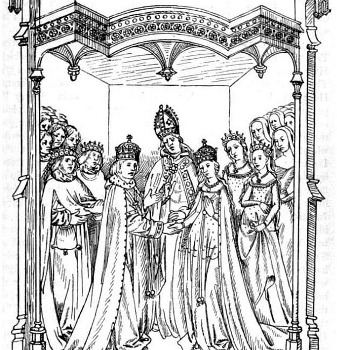Sign In
CloseSo this took me a few days to accomplish. And I did this many moons ago, already. But I've really been wanting to upload some of the text stuff I've done. Translations and my own writings alike. So this can mark the beginning of showing off what I actually do with my time.
As the title says, this is the famous St. Crispin's Day speech from Shakespeare's play Henry V.
It begins with Westmorland (Translated quite literally into Gothic as "Wistramaraland") and his line wishing for more soldiers from England. Then comes Henry's (In the nominative case, "Haimareiks") rebuttal and inspiring speech before the battle against the French.
The names were a great burden for me. I desperately wanted to translate them as close to their meaning as possible. E.g., Westmoreland = West more (archaic English reflex of a word for the sea) land, thus Wistra- mara land.
But for some names, it just wasn't so possible. For example, the name Exeter is, naturally, not formed from any Germanic word, and can not be translated. Instead, it can be rewritten as Goths rewrote names from other lands. Even the name-part "-c(h)ester", an old and nobly recognizable particle in English names and place names, is not at all Germanic, but the Old English reflex of the Latin word "castra" (camp), itself derived from "castrum" (fortress, military camp).
Anyway, here it is written in a font of the Gothic alphabet, as best as I could translate it from all sources available to me. I hope you can find some way to enjoy it, or find it interesting!
Here's the list of names/characters mentioned
- Haimareiks sa þiudans (Henry the King)
- Wistramaraland (Westmoreland)
- Krispinus (Crispin)
- Bedisfairþus (Bedford)
- Ïskatair (Exeter)
- Waraweihs (Warwick)
- Dalabota (Talbot)
- Salhabaurgs (Salisbury)
- Glaggwabaurgs (Gloucester)
Place name
- Aggilaland (England)
Submission Information
- Views:
- 607
- Comments:
- 6
- Favorites:
- 3
- Rating:
- General
- Category:
- Literary / Other
Comments
-
-

Well, as with all languages, the alphabet used to write it can't be used to form opinions of its grammar. It's nothing more than symbols representing sounds. Long ago English was written with runes. And now with the Roman alphabet. Granted, New English has a vast amount of words with French/Latin origin, English is not suddenly an Italic language. And rather, it's been shown that East Germanic had hefty influence on the Slavic peoples at the time the small group of languages/dialects was spoken. I'd even go as far as supporting the claim that Gothic influenced Continental Spanish pronunciation.
As far as being satem, it doesn't have any instance of velar > sibilants that other Germanic languages would have acquired through loan words or contact with other groups. As for the basis of centum-satem, the Gothic cognate of English "hundred" is "hund." Why I didn't say "the word for hundred is hund" would take a very long time to explain in full detail lol. I have a feeling you already know what I mean, though.
-

...
Uh, yes, I'm aware that Gothic is an Eastern, Germanic language, Kentum, and that the script doesn't represent or enforce the grammar (though one could argue that shared scripts effect* the existence of Sprachbunds). I was merely speaking of expectations. Certain orthographies strongly imply certain linguistic backgrounds. Cyrillic, Glagolithic, and Greek scripts strongly imply that one is looking at a Slavic language (or Greek). Seeing an abjad implies one is looking at a Semitic language. However, Maltese is written in the Latin alphabet and is Semitic. The Arabic Abjad is used for Indo-European Persian. Finnish, Polish, Turkish, Basque, Mongolian... many languages are not what one would 'expect' from the script.
Anyway, Gothic certainly had wide influences, thanks to the Ostrogothic and Visigothic conquests. There are even loan words from it in Tunisian Berber as I recall. Sadly, the 'Arian Heresy', destruction of the Gothic states, and its existence as the only well attested East Germanic language have cemented Gothic as a stranger. I certainly don't speak it. It'd take me quite a while to decipher the above text, and that's knowing the underlying source and having access to Gothic grammars!
BTW, does your translation represent the Ostro- or the Visi- dialect more? I know the two are very similar, but IIRC, there are some differences.
*Yes I mean effect, not affect.
-

I didn't say that you didn't know or were thinking that Gothic wasn't Germanic. Just putting it out there that I don't know why you would expect a Germanic language to be satem. Anyway, I have a bunch of sources that you are welcome to. I have pdf versions of all but one or two of my books. The absolute best, imo, is Joseph Wright's Grammar of the Gothic Language. There are several online sources too, dictionaries that are Eng-Got, Ger-Got, and so on. And some Got-Ger/Eng. There's also an amazing website that has most of the Silver Bible written online. You can search through it by book, chapter, and they even have a search function for looking up all of the passages with a specific word. Best website to double check how a word was used in Gothic. Also, if you click on any word in any passage (granted there's info on it) it will tell you the definition (in German, unfortunately if you don't speak it) and tell you the form(s) the word is in.
I couldn't tell you if this is a particular dialect that I know. The largest Gothic monument is thought to be Ostrogothic, and I'm not sure about the others. It could be a mix, or pretty much just Ostrogothic lol.
-

I have Gothic grammars in my apartment right this moment, mostly as parts of my general Germannic historical grammars.
I was just trying to emphasize how different Gothic feels from other Germannic languages.
-

At the risk of coming off sounding like a hipster, it's more original than anything found yet. It's really not all that different in form from what is considered Proto-Germanic. East Germanic seemed to simplify the language, while North and West Germanic introduced a vast number of radical changes. All the way from consonant shifts to sometimes using an almost completely different word, like ON maðr, mann. To me there's a big sense of being ancient with Gothic. Closer to the roots and more authentic in the classical world. I guess I just really like and prefer the history of the Gothic peoples, how they were some of the first Germans to fight the empire for life. It's hard for me to put to words.
-
-
-
-
-




Link
Irbis
East Germannic languages are strange. You can see the structures that give it relation to the West and North Germannic, but both the Greek-inspired script and the unusual structures make it seem more Slavic than Germanic. I'd almost expect it to be Satem looking at. XD